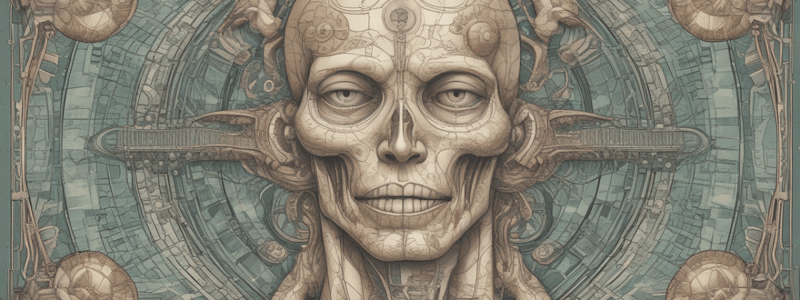Podcast
Questions and Answers
The ______ primarily maintain homeostasis but secrete a hormone.
The ______ primarily maintain homeostasis but secrete a hormone.
kidneys
[Blank] cells bind to protein.
[Blank] cells bind to protein.
Receptor
TRH comes from the ______ and travels to the infundibulum.
TRH comes from the ______ and travels to the infundibulum.
hypothalamus
TSH is a ______ hormone.
TSH is a ______ hormone.
Thyroid hormone increases hormone reactions in almost all cells and is a ______ hormone.
Thyroid hormone increases hormone reactions in almost all cells and is a ______ hormone.
Thyroid hormone increases hormone reactions in almost all ______.
Thyroid hormone increases hormone reactions in almost all ______.
Receptor cells bind to ______.
Receptor cells bind to ______.
TRH travels to the ______.
TRH travels to the ______.
The ______ is an endocrine gland.
The ______ is an endocrine gland.
The ______ primarily maintains homeostasis but also has an endocrine function.
The ______ primarily maintains homeostasis but also has an endocrine function.
Flashcards are hidden until you start studying
Study Notes
Endocrine System Overview
- The endocrine system consists of endocrine glands and organs with dual functions.
Endocrine Glands
- Thyroid gland
- Pancreas
- Ovaries
- Testicles
Organs with Dual Functions
- Kidneys: primarily maintain homeostasis, but also secrete hormones.
Receptor Cells and Hormone Functions
- Receptor cells bind to proteins to trigger hormone responses.
- Both exocrine and endocrine functions are present in the body.
Trophic and Non-Trophic Hormones
TRH (Thyrotropin-Releasing Hormone)
- Produced in the hypothalamus and travels to the infundibulum.
- Stimulates the anterior pituitary to produce TSH (Thyroid-Stimulating Hormone) through the hypothalamic-hypophyseal portal system.
TSH (Thyroid-Stimulating Hormone)
- A trophic hormone, stimulating another endocrine gland (thyroid).
- Triggers the production of thyroid hormones.
Thyroid Hormones
- Increase hormone reactions in almost all cells.
- Non-trophic hormone, directly affecting target cells.
Endocrine System Overview
- The endocrine system consists of endocrine glands and organs with dual functions.
Endocrine Glands
- Thyroid gland
- Pancreas
- Ovaries
- Testicles
Organs with Dual Functions
- Kidneys: primarily maintain homeostasis, but also secrete hormones.
Receptor Cells and Hormone Functions
- Receptor cells bind to proteins to trigger hormone responses.
- Both exocrine and endocrine functions are present in the body.
Trophic and Non-Trophic Hormones
TRH (Thyrotropin-Releasing Hormone)
- Produced in the hypothalamus and travels to the infundibulum.
- Stimulates the anterior pituitary to produce TSH (Thyroid-Stimulating Hormone) through the hypothalamic-hypophyseal portal system.
TSH (Thyroid-Stimulating Hormone)
- A trophic hormone, stimulating another endocrine gland (thyroid).
- Triggers the production of thyroid hormones.
Thyroid Hormones
- Increase hormone reactions in almost all cells.
- Non-trophic hormone, directly affecting target cells.
Studying That Suits You
Use AI to generate personalized quizzes and flashcards to suit your learning preferences.




